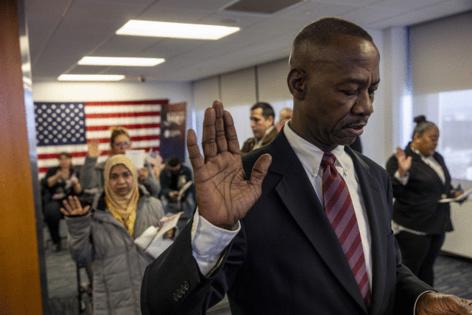COUNTERPOINT: We need less, not more, immigration
Published in Op Eds
We often hear from politicians that they are “against illegal immigration but in favor of legal immigration.”
Although this refrain may sound safely moderate, it actually ducks the critical policy questions related to immigration: Who may come? How many? And how do we enforce the limits we set?
Even as a record level of legal and illegal immigration is creating huge challenges for housing, schools, workplaces and hospitals, few people are answering these questions.
In February, the total foreign-born (immigrant) population, including legal and illegal immigrants, hit a record high of 51.4 million in the government’s monthly household survey, up 6.4 million since President Joe Biden took office. At 15.5% of the U.S. population, the foreign-born share has blown past the record high set in 1890 during the so-called “Great Wave” of immigration.
It is estimated that 3.7 million (58%) of the recent increase is because of illegal immigration. The increase in legal immigrants is also huge, at 2.7 million in just three years. The number of new arrivals was higher but was offset by those immigrants who went home or died in the last three years.
Illegal immigration is a long-standing problem, but most research shows the number of undocumented immigrants was relatively stable in the years before the pandemic, with the number of new undocumented immigrants offset by outmigration, deaths and legalization. Now, all of that has changed.
The border crisis was partly caused by the president’s campaign promises to curtail immigration enforcement. Ending the Remain in Mexico policy for asylum applicants, terminating Title 42 too soon, which returned border crossers to Mexico, and suspending the Asylum Cooperative Agreements with Central American countries all spurred illegal immigration.
The administration also decided to curtail the use of detention and “expedited removal,” which sends undocumented immigrants back to their home countries quickly. Once it became clear that the administration was not going to return people across the border, detain them, send them home quickly or require them to wait in Mexico, border “encounters” skyrocketed.
So far, the United States has released 3.3 million undocumented immigrants into the country, and there have been 1.7 million “got-aways” — people seen crossing illegally but not stopped. Nothing like this has ever happened before.
Although more than half the recent increase is from illegal immigration, three-fourths of the foreign-born are legal immigrants. Our legal immigration system is mainly based on family relationships, not skills. This, along with many immigrants’ relatively low education levels, is why 44% of new immigrants have no education beyond high school, up from 29% before COVID.
Less-educated immigrants earn low wages and make modest tax contributions, even when paid on the books. Their use of welfare programs, which they often qualify for through their U.S.-born children, creates significant costs for taxpayers.
By artificially increasing the supply of workers, legal and illegal immigration also depresses wages for the poorest and least-educated Americans. Additionally, our reliance on immigrant labor has allowed society to ignore the huge increase in less-educated men not in the labor force — neither working nor looking for work. Of U.S.-born men ages 20 to 64 with no education beyond high school, 25% were not in the labor force in 2023, compared to 7% in 1960. They do not show up as unemployed because they are not actively looking for work. The rise in non-work is linked to serious social pathologies, including crime and overdose deaths.
We need to undo the administration’s border policies, increase deportations and penalize employers who hire undocumented immigrants. Stopping localities from releasing jailed immigrants and denying them welfare, driver’s licenses and in-state college tuition would also help. Considering all the things we do to encourage illegal immigration, it’s absurd to suggest, as some do, that we have seriously tried to enforce the law.
We can move to a legal immigration system that reduces the numbers and selects immigrants based on their skills. We can also enforce our laws. Immigration is not the weather; it can be controlled and managed to benefit the American people.
____
ABOUT THE WRITER
Steven Camarota is the director of research at the Center for Immigration Studies. He wrote this for InsideSources.com.
___
©2024 Tribune Content Agency, LLC







Comments